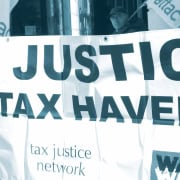|
Getting your Trinity Audio player ready...
|
The term ‘secrecy jurisdiction’ might, for many, conjure up the image of a fortified bank vault deep underground in a Swiss city, or a tropical island teeming with wealthy individuals and located far away from troublesome laws and regulations. And indeed, the world’s greatest enabler of global financial secrecy is currently the sunny Cayman Islands, a British overseas territory in the Caribbean Sea, whereas it used to be Switzerland with its numerous closely protected banks.
In part 2 of our new mini-series on financial secrecy, we focus on the Financial Secrecy Index (FSI), published every two years by the Tax Justice Network (TJN) – the 2020 edition is the sixth since 2009. Part 1 of the series looked at the definition of and gave information on secrecy jurisdictions and financial secrecy, and part 3 covers the Corporate Tax Haven Index, also a TJN project.
Several countries, such as China, France, Germany, and Japan, are not traditionally considered to be secrecy jurisdictions, says TJN. In fact, far from fitting the stereotype of sleepy, palm-fringed islands, the organisation adds, the world’s most important providers of financial secrecy and repositories of looted assets are actually some of its biggest and wealthiest countries. And the main beneficiaries of or channels for the illicit flows are rich OECD member countries and their satellites.
Financial secrecy provides these culprits with the tools to drive the global industry of illicit financial flows, tax evasion, and secrecy services. The FSI, therefore, works against this corrupt tendency by aiming to identify and expose the most important providers of international financial secrecy. Powerful jurisdictions have the capability to sway, on an international scale, the balance of the economy, equality, development, and power in rich and poor countries alike – it is thus vital to expose and disrupt their nefarious activities.
Using 20 key financial secrecy indicators, shown in the table below, the FSI comprehensively assesses the secrecy of financial centres and the impact of that secrecy on global financial flows. It assigns each country a secrecy score out of 100, where zero is full transparency and 100 is extreme opacity, and factors in the global scale weight – the level of financial activity conducted in the country by non-residents i.e. offshore financial service – which influences the jurisdiction’s slice of the market and its impact on the global financial secrecy trade. The two factors are mathematically amalgamated to produce an FSI value, by which each country is ranked.
| Banking Secrecy | Tax Administration Capacity | |
| Trusts and Foundations Register | Consistent Personal Income Tax | |
| Recorded Company Ownership | Avoids Promoting Tax Evasion | |
| Other Wealth Ownership | Tax Court Secrecy | |
| Limited Partnership Transparency | Harmful Structures | |
| Public Company Ownership | Public Statistics | |
| Public Company Accounts | Anti-Money Laundering | |
| Country-by-Country Reporting | Automatic Information Exchange | |
| Corporate Tax Disclosure | Bilateral Treaties | |
| Legal Entity Identifier | International Legal Co-operation |
The FSI’s key indicators are grouped into four dimensions of secrecy – ownership registration, legal entity transparency, integrity of tax and financial regulation, and international standards and co-operation.
The latest FSI shows clear signs of improvement, says TJN, stemming from the global financial crisis and ensuing economic crisis that arose around 2008. Add to this a recent rise in activism and exposure of secrecy problems, mainly by civil society and media, and heightened awareness of and concern about inequality in many countries. The result, says the organisation, is “a set of political conditions unparalleled in history. The world’s politicians have been forced to take notice of tax havens”.
On that note, the use of the terms secrecy jurisdiction and tax haven is generally interchangeable, says TJN, but it prefers the former in this context.
The top 10 for 2020, ranked by their FSI values, are:
- Cayman Islands
- United States
- Switzerland
- Hong Kong
- Singapore
- Luxembourg
- Japan
- Netherlands
- British Virgin Islands
- United Arab Emirates
FSI 2020 reveals glimmer of hope
The first thing to take from the sixth FSI is that the Cayman Islands is now the territory most complicit in aiding and abetting those who would hold tight to every last coin of their dirty money by removing it from the mainstream financial system. It overtook both Switzerland and the US – which itself overtook Switzerland to land in second place – to make its debut at the top of the table. This is the first time since 2011 that Switzerland was not the worst offender,
The UK, meanwhile, increased its levels of secrecy more than any other country. Its secrecy score rose from 42 to 46 out of 100, (the global average was a decrease of 3 marks), and it upped its overall supply of financial secrecy to the world by 26% (global average was a decrease of 7%). This moved the UK from 23rd in the rankings to 12th in 2020.
The second thing to note is that financial secrecy around the world is decreasing as a result of recent transparency reforms. On average, countries on the index reduced their contribution to global financial secrecy by 7%, TJN reveals.
It is also important to recognise that because the FSI value reflects a combination of secrecy level and the extent of the role the country plays in enabling others to be secretive, a highly secretive country that offers fewer offshore services might rank below one that is not as secretive but plays a bigger role in promoting financial secrecy. TJN gives the example of Samoa (highly secretive, little to no offshore financial services, ranked 86th) and Japan, not as secretive, a major player, ranked 7th).
“A higher rank on the index does not necessarily mean a jurisdiction is more secretive, but rather that the jurisdiction plays a bigger role globally in enabling secretive banking, anonymous shell company ownership, anonymous real estate ownership or other forms of financial secrecy, which in turn enable money laundering, tax evasion and huge offshore concentrations of untaxed wealth.”
The latest shuffle in the ranks, says TJN, reflects three high-profile international stories of recent times: a British territory topped the index for the first time on the same day the EU blacklisted the territory; the US continued to escalate its financial secrecy despite ambitions announced by Senator Lindsey Graham; and Switzerland shed its status as the world’s greatest enabler of financial secrecy amid a global trend of governments curbing financial secrecy.
“The index also told many regional and country-specific stories on which we worked with our partners and allies around the world to shine a spotlight on.”
As global financial secrecy continues to shrink – by fully 7% since 2018 – a space has appeared in which to clamp down even further on secretive banking, anonymous shell company ownership or anonymous real estate ownership. This means fewer opportunities to engage in money laundering, tax evasion, and accumulating huge offshore concentrations of illicit and untaxed wealth.
The biggest reforms, TJN points out, have been in relation to automatic exchange of information (an average reduction of 9 marks out of 100) and beneficial ownership registration (4 marks), but country-by-country reporting has not reformed nearly as much (0.4 marks). “These three areas of reform, also known as the ‘ABCs’ of tax justice, have gained the most attention from campaigners, tax experts and policymakers in recent years.”
South Africa
In 2018, when the previous edition of the FSI was released, South Africa ranked 50 out of 112. Its FSI value was 216.43, and its secrecy score was 56, just one tier below ‘exceptionally secretive’ (75 – 100 marks). In 2020, the country slipped to a ranking of 58 out of 133, with an FSI value of 218.59 and a secrecy score, again, of 56. This is not necessarily a decline, as there are 21 more countries on the latest index. Nor is it an improvement, because of lingering factors that influence the country’s performance.
Furthermore, South Africa accounts for just 0.19% of the global market for offshore financial services, so it is a small player compared to other secrecy jurisdictions. And its secrecy score of 56 is the second lowest of the 15 African jurisdictions assessed. Its FSI ranking of 58 puts it in seventh place on the continent.
However, state capture loomed large in the country’s narrative report, as did capital flight.
“The ensnaring of the state by business interests did not stop with the end of the apartheid regime. In fact, the recent ‘Gupta Leaks’ reveal the extent of what is described by some South Africans, including former Public Protector Thuli Madonsela, as state capture.”
To reduce their tax obligations, the country’s elite, and South African and foreign multinational companies within its borders do not hesitate to exploit weaknesses in legislation and use other secrecy jurisdictions. In a country with deep inequality, this has a profound effect.
“Some of the largest companies listed on the Johannesburg Stock Exchange, including SAB Miller and Anglo American, have been implicated in tax avoidance stories relating to other countries.”
Recommendations
The 2020 FSI shows that robust international standards on transparency can be effective in driving meaningful progress. TJN recommends three immediate actions:
- Counter-measures. Governments are increasingly recognising the harmful consequences of financial secrecy, and have begun to take action to reduce it. To truly stamp out financial secrecy, meaningful counter-measures are now needed against jurisdictions and their economic actors that refuse to cooperate – regardless of their economic power.
- Corporate tax transparency. As the OECD reviews its standard for country by country reporting this year, they must address the major technical flaws of current standards and converge towards the new Global Reporting Initiative (GRI) tax standard. Governments, including those of the EU which have repeatedly delayed, must follow the lead of major companies that are now voluntarily reporting such data, and make publication mandatory.
- Anonymous ownership. The Financial Action Task Force must add public registration of beneficial owners and legal owners of all legal vehicles to its binding recommendations.








